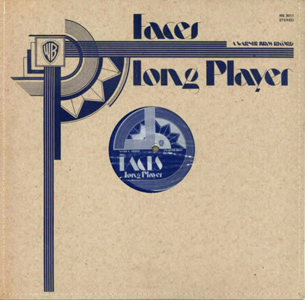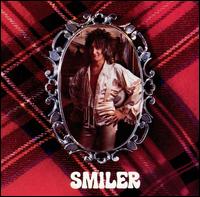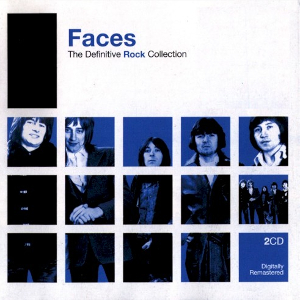Faces are an English rock band formed in 1969 by members of Small Faces after lead singer and guitarist Steve Marriott left to form Humble Pie. The remaining Small Faces—Ian McLagan (keyboards), Ronnie Lane, and Kenney Jones —were joined by guitarist Ronnie Wood and singer Rod Stewart, both from the Jeff Beck Group, and the new line-up was renamed Faces.

Ronald Frederick Lane was an English musician and songwriter who was the bassist and co-founder of the rock bands Small Faces (1965–69) and Faces (1969–73).

Ooh La La is the fourth and final studio album by the English rock band Faces, released in March 1973. It reached number one in the UK Albums Chart in the week of 28 April 1973. The album was most recently reissued on CD in a remastered and expanded form on 28 August 2015, including early rehearsal takes of three of its tracks, as part of the 1970–1975: You Can Make Me Dance, Sing Or Anything... box set. The box set's vinyl counterpart did not contain any bonus tracks, but it did replicate the original LP artwork and 'animated' cover.

Small Faces is the second studio album by Small Faces, released through Immediate Records on 23 June 1967. Although this was their first album for new manager Andrew Loog Oldham's Immediate label, recording actually commenced during their tenure with Decca Records, whom they left in January 1967 after severing professional ties with original manager Don Arden. As a result of the switch of label and management, Decca and Arden released an outtakes compilation album, From the Beginning in early June 1967 in order to sabotage the chart success of the Immediate Small Faces release - something that it managed to do to some extent when From the Beginning reached number 17 in the UK charts. The Immediate album shares its name with their 1966 Decca debut album, which has led to some confusion regarding the titles. As a result of this, it has been unofficially dubbed The First Immediate Album by several fans.

A Nod's as Good as a Wink... To a Blind Horse is the third album by British rock group Faces, and their second album of 1971. Bolstered somewhat by lead singer Rod Stewart's recent solo success with "Maggie May", it was their most successful album worldwide, peaking at No. 6 in the US, and reaching No. 2 in the UK. It also contains their biggest US hit, the swaggering "Stay with Me", and the album itself would be certified gold by the RIAA in 1972.

Long Player is the second album by the British rock group Faces, released in February 1971. Among the highlights are a live cover version of Paul McCartney's "Maybe I'm Amazed", the ballads "Richmond" and "Sweet Lady Mary", the party tune "Had Me a Real Good Time", and uptempo saloon bar rocker "Bad 'n' Ruin". Two tracks, "Maybe I'm Amazed" and "I Feel So Good", were recorded live at the Fillmore East, New York City, on 10 November 1970.

First Step is the debut studio album by the English rock band Faces, released on 27 March 1970 by Warner Bros. Records. The album was released only a few months after the Faces had formed from the ashes of the Small Faces and The Jeff Beck Group. The album is credited to the Small Faces on all North American issues and reissues, while record labels for initial vinyl printings give the title as The First Step.

Coast to Coast: Overture and Beginners is a 1974 live album credited to Rod Stewart/Faces. Stewart's practice was not giving concerts as a solo act at the time, but rather appearing jointly with the Faces, thus the dual crediting.

Good Boys... When They're Asleep... was a 1999 compilation of British rock group Faces. Compiled primarily by keyboardist Ian McLagan, it served to supersede the 1976 effort Snakes And Ladders / The Best of Faces, and to present a CD-length retrospective of the group, lasting nearly eighty minutes.

Five Guys Walk into a Bar... is a comprehensive four-disc retrospective of the British rock group Faces released in 2004, collecting sixty-seven tracks from among the group's four studio albums, assorted rare single A and B-sides, BBC sessions, rehearsal tapes and one track from a promotional flexi-disc, "Dishevelment Blues" - a deliberately-sloppy studio romp, captured during the sessions for their Ooh La La album, which was never actually intended for official release.

Smiler is the fifth solo album by English rock singer-songwriter Rod Stewart. It was released September 27, 1974 by Mercury Records. It reached number 1 in the UK album chart, and number 13 in the US. The album included covers of Chuck Berry, Sam Cooke and Bob Dylan songs, as well as a duet with Elton John of John's song "Let Me Be Your Car". Stewart also covered Carole King's "(You Make Me Feel Like) A Natural Woman" where 'Woman' is switched to 'Man'. The release of the album was held up for five months due to legal problems between Mercury Records and Warner Bros. Records.
Tetsu Yamauchi is a Japanese retired bass guitarist. In the 1970s, he was a member of several popular hard rock bands, including Free, where he replaced former bassist Andy Fraser before the band's final album Heartbreaker, and the Faces, where he replaced Ronnie Lane and appears on the band's final single, "You Can Make Me Dance, Sing or Anything", as well as touring with them and playing on the live album Coast to Coast: Overture and Beginners. He also recorded a number of solo albums and did extensive work as a session musician before retiring from the music industry in the late 1990s.

Mahoney's Last Stand is an album by Faces bandmates Ronnie Wood and Ronnie Lane, recorded in 1972. It is the music soundtrack album of the low-budget 1972 Canadian film Mahoney's Last Stand starring Alexis Kanner, Sam Waterston and Maud Adams. The film itself, little seen at the time of its release and even less so since, charts the progress of city-dweller Mahoney (Kanner) who abandons his urban existence to become a homesteader, and the drama that ensues. Pete Townshend, who guests on guitar on some tracks on the album, also receives a credit in the film for providing 'special electronic effects', alongside Wood and Lane's musical score.

Lead Vocalist is a compilation album released by Rod Stewart on 22 February 1993. It was released by Warner Bros. Records in the UK and Germany, but was never released in the US. Three songs from this album either had previously or would be released as singles: "Tom Traubert's Blues", "Shotgun Wedding", and "Ruby Tuesday".

"Ooh La La" is a 1973 song by the band Faces, written by Ronnie Lane and Ronnie Wood. It is the title song of the band's last studio album, Ooh La La.

"You Can Make Me Dance, Sing or Anything (Even Take the Dog for a Walk, Mend a Fuse, Fold Away the Ironing Board, or Any Other Domestic Shortcomings)" was the last official single by British rock group Faces, released in November 1974. It later appeared on their 1976 greatest hits album Snakes and Ladders / The Best of Faces.
"Cindy Incidentally" is a song by the British group Faces, written by group members Rod Stewart, Ronnie Wood and Ian McLagan. It was produced by Glyn Johns. It was included on the band's 1973 album Ooh La La, and in the same year was released by Warner Bros. Records as the first single from that album.

"My Way of Giving" is a song written by Steve Marriott and Ronnie Lane. Initially demoed by their band Small Faces in 1966, it was given to British singer Chris Farlowe, who released his version as a single in early 1967. It was Farlowe's first single not written by Jagger–Richards since 1965's "The Fool". The Small Faces themselves decided to go on and record a version which was released on two different albums on two different record labels.

The Definitive Rock Collection is a two-disc retrospective of the British rock group Faces released in 2007, collecting thirty tracks from among the group's four studio albums, various single A and B-sides, and an outtake from the sessions for a proposed but ultimately abandoned 1975 album.
















